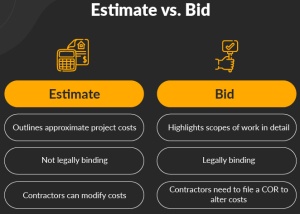 Embarking on an alterations or additions project is a significant undertaking that requires careful planning and decision-making. One of the most crucial decisions homeowners face is how to structure the contract with their contractor. Understanding the nuances between different contract types, particularly fixed-price contracts (bids) and time and materials (T&M) contracts, is essential for managing costs effectively and ensuring the project’s success. In this guide we’ll delve into the key aspects of each contract type, providing valuable insights and considerations for homeowners and contractors alike.
Embarking on an alterations or additions project is a significant undertaking that requires careful planning and decision-making. One of the most crucial decisions homeowners face is how to structure the contract with their contractor. Understanding the nuances between different contract types, particularly fixed-price contracts (bids) and time and materials (T&M) contracts, is essential for managing costs effectively and ensuring the project’s success. In this guide we’ll delve into the key aspects of each contract type, providing valuable insights and considerations for homeowners and contractors alike.
Fixed-Price Contracts (Bids)
Fixed-price contracts, commonly referred to as bids, offer homeowners a sense of cost certainty in an otherwise complex construction landscape. These contracts outline a specific price for a defined scope of work, providing clarity and predictability in terms of project costs. For example, a bid might detail the removal and replacement of roofing materials for a set price, including labor, materials, and any associated expenses.
Pros of Fixed-Price Contracts
• Clear Cost Projection: Bids provide homeowners with a clear projection of project costs, including a not-to-exceed amount unless there are changes to the scope of work.
• Structured Payments: Payments are typically structured based on milestones or calendar dates, offering predictability and ease of budgeting.
• Competitive Analysis: Homeowners can compare bids from different contractors, ensuring competitive rates and value for money.
• Emphasis on Value: Contractors can focus on showcasing their value proposition and expertise rather than engaging in rate comparisons.
Cons of Fixed-Price Contracts
• Potential Cost Overruns: The built-in cushion in bids can lead to higher costs for homeowners if changes or additions to the scope of work occur.
• Lack of Detail: Specifications in bids may lack transparency, potentially leading to unexpected change orders and additional costs.
• Limited Flexibility: Homeowners may have less control over subcontractor selection and project details, relying heavily on the contractor’s expertise and decisions.
Considerations for Fixed-Price Contracts
Detailed and comprehensive scope of work documentation is crucial in fixed-price contracts to minimize allowances and potential cost overruns. Homeowners should carefully review bid documents, understand the inclusivity of the bid, and clarify any ambiguities or uncertainties before finalizing the contract.
Time and Materials (T&M) Contracts
Time and materials contracts, also known as cost-plus contracts, operate on a different paradigm, offering flexibility and transparency in project costing. Unlike fixed-price contracts, T&M contracts bill clients based on actual hours, materials used, and subcontractor costs incurred during the project.
Pros of Time and Materials Contracts
• Transparency and Accountability: T&M contracts offer transparency by allowing clients to track actual costs, ensuring accountability and fair billing for work completed.
• Cost Control: Clients pay for the actual work, materials, and subcontractor costs incurred, avoiding potential overruns associated with fixed-price contracts.
• Adaptability: T&M contracts are well-suited for projects with evolving requirements, unknown variables, or phased construction timelines.
Cons of Time and Materials Contracts
• Cost Monitoring: T&M contracts require diligent cost monitoring and oversight to prevent budget overruns and ensure cost-effectiveness.
• Complexity: Detailed estimates and ongoing monitoring can be complex and overwhelming for some homeowners, requiring additional collaboration and documentation.
Considerations for Time and Materials Contracts
Effective cost controls, regular progress monitoring, and collaboration with experienced professionals such as architects or project managers are essential in T&M contracts to ensure project success and cost efficiency. Homeowners should also seek clarity on billing procedures, cost breakdowns, and potential contingencies before entering into a T&M contract.
Hybrid Contracts: Finding the Middle Ground
In some cases, contractors may offer hybrid contracts that combine elements of both fixed-price and T&M contracts. These hybrid contracts may include a not-to-exceed amount or a fixed contractor’s fee while retaining some flexibility in terms of materials and labor costs.
Pros and Cons of Hybrid Contracts
• Cost Control and Flexibility: Hybrid contracts offer a balance between cost control and flexibility, providing homeowners with some predictability while allowing for adjustments based on project needs.
• Negotiation Complexity: Negotiating hybrid contracts requires careful consideration of cost implications, project scope changes, and contractor incentives, adding complexity to the contract negotiation process.
Conclusion: Making Informed Choices
Choosing the right contract type—whether a fixed-price bid, a T&M contract, or a hybrid approach—requires careful consideration of project specifics, budget constraints, and desired level of control. Homeowners and contractors should collaborate closely, communicate effectively, and seek professional guidance when necessary to ensure successful and cost-effective construction projects. By understanding the pros, cons, and considerations of each contract type, homeowners and contractors can navigate the construction process with confidence and achieve their project goals efficiently.
For Further Reading
• “Types of Construction Contracts: What You Need to Know”, an article by ConstructConnect, can be found at: https://www.constructconnect.com/blog/types-of-construction-contracts-what-you-need-to-know
• BrainHub has published an article on this subject, “Time and Materials vs Fixed Fee – Detailed Comparison”, located at: https://brainhub.eu/library/time-and-materials-vs-fixed-price
• An article on this subject, “Estimates vs Bids – What homeowners need to know?” by HomePreservationManual is at: https://www.homepreservationmanual.com/estimates-vs-bids-what-homeowners-need-to-know/
